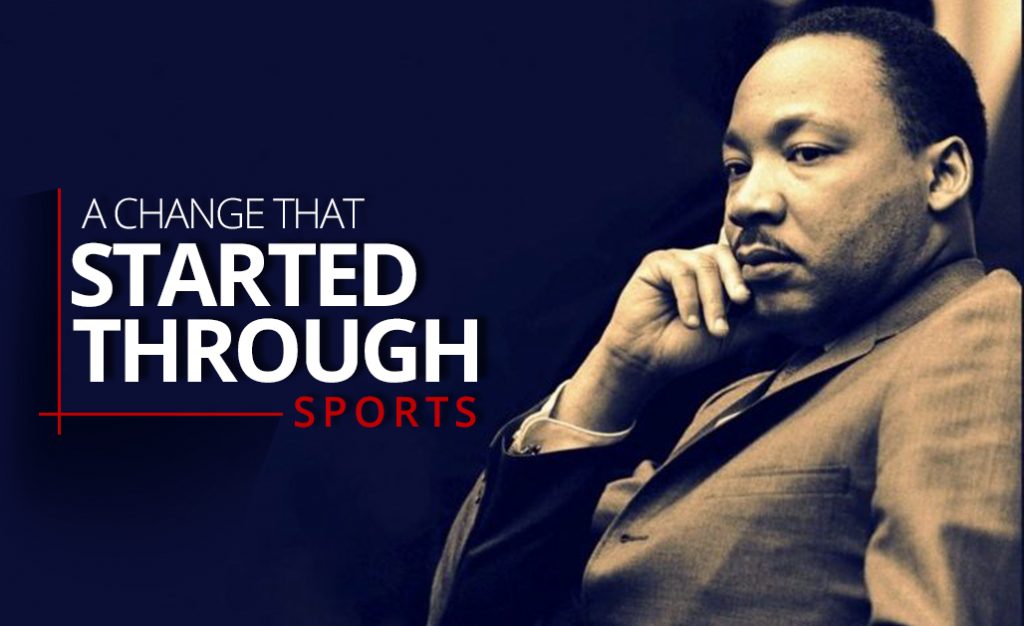This Martin Luther King Jr. Day, celebrate boxing’s contributions to social change. Arguably, boxing was the first sport to be politicized for the greater good.
Athletes have always had a lot of influence with their supporters. More and more, athletes have used their influence to talk about social issues. At the forefront of this movement were boxing and Muhammad Ali. They influenced the public in a way that sports and athletes had never done before.
Muhammad Ali’s Rise to Prominence
Ali became an instant superstar when he beat Sonny Listen to claim the World Heavyweight Championship. His skills and confidence was unlike anything the boxing world had ever seen. A shameless self-promoter and a world-class trash-talker, Ali had the skills to back it up.
Despite criticism, Ali changed many people’s perception of those marginalized on the basis of race and class. To a lot of the people who grew up like him, he was aspirational. For the rest, Ali was the first athlete to use his sport and platform to shine a light on issues they had never thought of.
More importantly, Ali was inspirational because he was outspoken. Ali put boxing at the forefront of social and political causes. He spoke out on issues that were important to him. Moreover, Ali forced people to listen to him when it was easy to write off boxers and athletes as self-important meatheads.
Boxing’s Contributions to Social Change
Boxing was central to many of Ali’s efforts. For example, in 1967, boxing gave him the prestige and platform to be a vocal critic of the Vietnam War. The U.S. army drafted Ali to fight in the war but Ali objected on moral and religious grounds. Consequently, the U.S. government stripped him of his heavyweight title. Ali did not fight from March 1967 to October 1970 – the years of his prime. Still, Ali never wavered from his convictions, even when his career was on the line.
The true intersection of boxing and social cause occurred when Muhammad Ali supported Dr. Martin Luther King Jr. Dr. King was a civil rights activist in the U.S. In 1967, King took his cue to resist the Vietnam War from Ali. At the time, Ali had already become the most prominent protester to the Vietnam War draft.
When asked why Dr. King would involve himself in foreign policy, Dr. King said,
“Like Muhammad Ali puts it, we are all—black and brown and poor—victims of the same system of oppression.”
Similarly, Ali gave his support to Dr. Martin Luther King Jr. at a rally in Louisville, KY. Ali said to Dr. King,
“In your struggle for freedom, justice and equality, I am with you.”
Sports and Social Change Today
In recent years, it has become fairly common for athletes to speak out on the issues most important to them. Often times, they have been praised and criticized. Some have argued that athletes should leave social change to activists.
For example, Laura Ingraham’s “shut up and dribble” comment about LeBron James upset his supporters. At the same time, some people bashed James for involving himself in political issues. Similarly, Colin Kaepernick’s freezing out from the NFL for taking a knee polarized the American public.
Fortunately (or unfortunately), the rising culture of accountability no longer allows athletes to just “shut up and dribble”. Increasingly, athletes and sports stars believe it is just to use their platform to advocate social improvement.
For a long time, boxing was the sole example of a sport that impacted people outside of its immediate circle of influence. Even now, Ali continues to be popular. This is because Ali collected a lot of influence and goodwill as a boxer and used his influence in boxing outside of it, to affect others.
Many athletes have tried to follow in his path since. They believe that their duty is to use their power and profile to influence social issues. Accountability is the new standard, and it all began with boxing.

